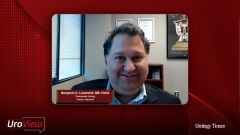
Next steps investigating AR inhibitors in advanced prostate cancer
Based on long-term data and clinical experience treating advanced prostate cancer with androgen receptor inhibitors, Drs Julie N. Graff and Benjamin H. Lowentritt suggest ideas for future study.
Episodes in this series

Benjamin H. Lowentritt, MD, FACS: In the last year or so when we’ve all been virtual and unable to go to a lot of these bigger meetings, there have been meetings happening and data presented. Do you want to talk a little about some of the emerging data that have come out recently and what they can tell us as we look to build on our experience?
Julie N. Graff, MD: Yes, Ben. I have a couple thoughts about it. One is we’re getting all these new agents, but they still fall into existing classes. It was cool when we had enzalutamide and abiraterone. We had these genuinely new agents, and now we have 2 more androgen receptor antagonists. The lessons being learned now are that the more intense the treatment up front, the better, and that if you’re going to go for castration therapy, go for maximal androgen deprivation therapy. There probably won’t be much of a role for androgen deprivation therapy or castration by itself anymore. It’s going to be that plus other more intense hormonal treatments. As I said earlier, the addition of chemotherapy followed by these hormonal drugs will probably become more popular.
An important point for the androgen receptor antagonists is that they have a common mechanism through which they become ineffective. The androgen receptor loses the ligand-binding domain, and the drugs don’t have anywhere to bind. That AR-V7 mutation is the most common one. It also affects abiraterone. As far as newer therapies, although we now have several androgen receptor antagonists, we’re looking more at androgen degraders, androgen blockers that work in ways other than binding to that ligand-binding domain. I hope to see more of those drugs soon.
Benjamin H. Lowentritt, MD, FACS: Yes, that’s very exciting. The possibilities are endless. We’ve spent a lot of time now with—it’s not really in the scope of what we’re discussing today—looking for that subset of patients who might be eligible for PARP inhibitors and other therapies in the advanced state after failing drugs like those we’re mainly talking about. As we learn more from those studies about what’s really happening within the tumors and do more appropriate study of those tumors, right alongside is all the development of hopefully more targeted agents and learning from other cancers and everything else that we can see, just like a PARP inhibitor showed us in coming from early experience with ovarian, breast, pancreatic, and other cancers.
The future is only going to be more complicated. But with these androgen receptor inhibitors, the question is are we ever going to really be done with hormonal-mediated treatments? It’s hard to imagine we’ll find anything that’s as good. We’d all love to avoid it or maybe find a way to create a window where we’re not treating it. But especially now that we know that more intense therapy is better earlier, it’s hard to imagine a world where we walk away from that benefit. Maybe we can delay it or do something else where we continue to put nonhormonal agents earlier. It’s exciting, but more and more we’re going to be doing exactly as you said, which is finding these agents that help us when traditional hormonal-mediated therapies don’t work. Maybe we can still go to the androgen receptor as a target, just in a slightly different way, and that’s what’s exciting.
Most recently, at the AUA [American Urological Association annual meeting], there was a presentation of specific targeted therapies that can get at just what you were saying, the AR-V7–positive binders.
Transcript edited for clarity.
Newsletter
Stay current with the latest urology news and practice-changing insights — sign up now for the essential updates every urologist needs.











